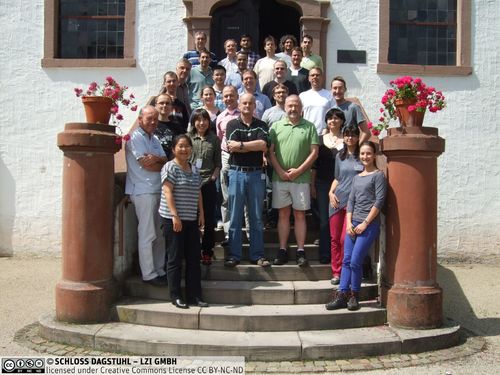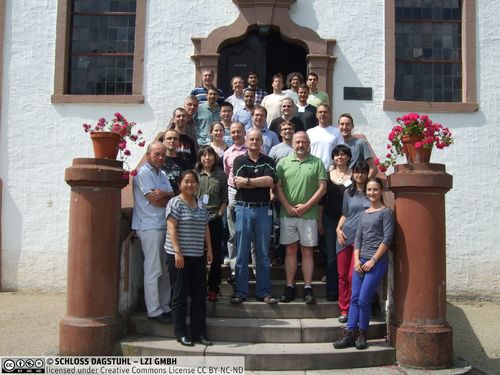Dagstuhl-Seminar 12321
Robust Query Processing
( 05. Aug – 10. Aug, 2012 )
Permalink
Organisatoren
- Goetz Graefe (HP Labs - Madison, US)
- Wey Guy (Redmond, US)
- Glenn Paulley (Conestoga College - Kitchener, CA)
Koordinator
- Harumi Anne Kuno (HP Labs - Palo Alto, US)
Kontakt
- Andreas Dolzmann (für wissenschaftliche Fragen)
- Annette Beyer (für administrative Fragen)
Dagstuhl Seminar Wiki
- Dagstuhl Seminar Wiki (Use personal credentials as created in DOOR to log in)
Impacts
- Smooth Scan : robust access path selection without cardinality estimation : article - Borovica-Gajic, Renata; Idreos, Stratos; Ailamaki, Anastasia; Zukowski, Marcin; Fraser, Campbell - Berlin : Springer, 2018. - 25 pp. - (VLDB journal ; 2018).
- Smooth Scan : Statistics-Oblivious Access Paths : article in ICDE 2015 : pp. 315-326 - Borovica- Gajic, Renata; Idreos, Stratos; Ailamaki, Anastassia; Zukowski, Marcin; Fraser, Campbell - Los Alamitos : IEEE, 2015 - (International Conference on Data Engineering ICDE 2015).
In early August 2012 researchers from both academia and industry assembled in Dagstuhl at the 2012 Dagstuhl Workshop on Robust Query Processing, Workshop 12321. An earlier Workshop---Dagstuhl Workshop 10381---held in September 2010 had supplied an opportunity to look at issues of Robust Query Processing but had failed to make significant progress in exploring the topic to any significant depth. In 2012, 12321 Workshop participants looked afresh at some of the issues surrounding Robust Query Processing with greater success and with the strong possibility of future publications in the area that would advance the state-of-the-art in query processing technology.
A considerable amount of query processing research over the past 20 years has focused on improving relational database system optimization and execution techniques for complex queries and complex, ever-changing workloads. Complex queries provide optimization challenges because selectivity and cardinality estimation errors multiply, and so there is a large body of work on improving cardinality estimation techniques and doing so in an autonomic fashion: from capturing histogram information at run time, to mitigating the effects of correlation on the independence assumption , to utilizing constraints to bound estimation error, to permitting various query rewritings to simplify the original statement. Studies of the feasibility of query re-optimization, or deferring optimization to execution time, have until recently largely been based on the premise that the need for such techniques is due either to recovering from estimation errors at optimization time in the former case, or avoiding the problem entirely by performing all optimization on-the-fly, such as with Eddies rather than in a staged, "waterfall" kind of paradigm.
More recent work on adaptive query processing has considered techniques to handle the interaction of query workloads, coupled with the realization that changes to environmental conditions can significantly impact a query's chosen execution plan. These environmental conditions include:
- changes to the amount of memory available (buffer pool, heap memory);
- changes to I/O bandwidth due to concurrent disk activity;
- locking and other waits caused by concurrency control mechanisms;
- detected flaws in the currently executing plan;
- number of available CPU cores;
- changes to the server's multiprogramming level;
- changes to physical access paths, such as the availability of indexes, which could be created on the fly;
- congestion with the telecommunications network;
- contents of the server's buffer pool;
- inter-query interaction (contention on the server's transaction log, 'hot' rows, and so on.
- Martina-Cezara Albutiu (TU München, DE)
- Peter A. Boncz (CWI - Amsterdam, NL) [dblp]
- Renata Borovica-Gajic (EPFL - Lausanne, CH) [dblp]
- Surajit Chaudhuri (Microsoft Corporation - Redmond, US) [dblp]
- Campbell Fraser (Microsoft Corporation - Redmond, US) [dblp]
- Johann-Christoph Freytag (HU Berlin, DE) [dblp]
- Goetz Graefe (HP Labs - Madison, US) [dblp]
- Ralf Hartmut Güting (FernUniversität in Hagen, DE)
- Wey Guy (Redmond, US) [dblp]
- Theo Härder (TU Kaiserslautern, DE) [dblp]
- Fabian Hüske (TU Berlin, DE) [dblp]
- Stratos Idreos (CWI - Amsterdam, NL) [dblp]
- Ihab Francis Ilyas (University of Waterloo, CA) [dblp]
- Alekh Jindal (Universität des Saarlandes, DE)
- Martin L. Kersten (CWI - Amsterdam, NL) [dblp]
- Harumi Anne Kuno (HP Labs - Palo Alto, US) [dblp]
- Andrew Lamb (Vertica Systems - Cambridge, US)
- Allison Lee (Oracle Labs., US) [dblp]
- Stefan Manegold (CWI - Amsterdam, NL) [dblp]
- Anisoara Nica (Sybase - Waterloo, CA) [dblp]
- Glenn Paulley (Conestoga College - Kitchener, CA) [dblp]
- Ilia Petrov (TU Darmstadt, DE) [dblp]
- Meikel Poess (Oracle Labs., US) [dblp]
- Ken Salem (University of Waterloo, CA) [dblp]
- Bernhard Seeger (Universität Marburg, DE) [dblp]
- Krzysztof Stencel (University of Warsaw, PL)
- Knut Stolze (IBM Deutschland - Böblingen, DE) [dblp]
- Mike Waas (EMC Greenplum Inc. - San Mateo, US)
- Jianliang Xu (Hong Kong Baptist University, HK) [dblp]
- Marcin Zukowski (ACTIAN - Amsterdam, NL) [dblp]
Verwandte Seminare
- Dagstuhl-Seminar 10381: Robust Query Processing (2010-09-19 - 2010-09-24) (Details)
- Dagstuhl-Seminar 17222: Robust Performance in Database Query Processing (2017-05-28 - 2017-06-02) (Details)
- Dagstuhl-Seminar 22111: Database Indexing and Query Processing (2022-03-13 - 2022-03-18) (Details)
- Dagstuhl-Seminar 24101: Robust Query Processing in the Cloud (2024-03-03 - 2024-03-08) (Details)
Klassifikation
- databases / information retrieval
- data structures / algorithms / complexity
- optimization / scheduling
- autonomic computing
Schlagworte
- robust query processing
- adaptive query optimization
- query execution
- indexing
- workload management
- reliability
- application availability



